Pro-democracy protests in HK: But what is democracy for them?
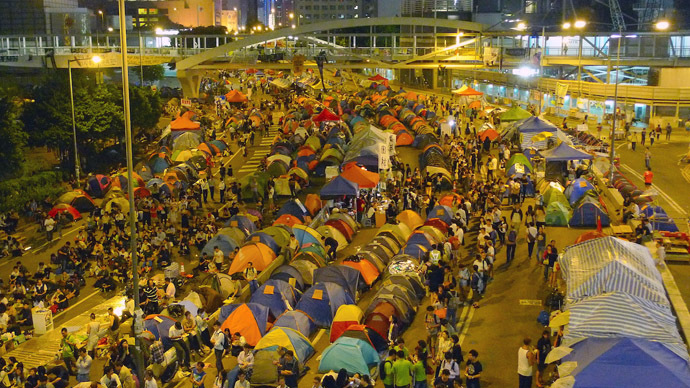
Hong Kong protesters - mainly students who lack ideology and political awareness - are playing to the hands of the West, which has lately been demonizing all governments resisting its quest for global dominance.
At the North Point in Hong Kong, near Kowloon Ferry, a middle-aged man is waving a banner that reads “Support Our Police.” On the photo, the tents and umbrellas of the “pro-democracy” “Occupy Central” protest movement (also known as the “Umbrella Movement”) are depicted in a depressing sepia color.
“Are you against the protesters?” I ask the man.
“I am not for or against them,” he replies. “But it is known that they have some 1 million supporters here. While Hong Kong has over 7 million inhabitants. We think that it is time to clear the roads and allow this city to resume its normal life.”
“On the 28 September,” I continue, “police fired 87 canisters of tear gas at the protest site, and now this fact is being used in the West and here as some proof of police brutality and of Beijing’s undemocratic rule. Protesters even commemorated this event a few days ago, as if that would turn them to martyrs...”
“They are spoiled,” a man smiled. “They mostly come from very rich families in one of the richest cities on earth. They don’t know much about the world. I can tell you that the students in Beijing know actually much more about the world... 87 canisters of tear gas are nothing, compared to what happened in Cairo or in Bangkok. And in New York, police was dragging and beating protesters, even female protesters, during the endgame of the Occupy Wall Street drama.”
Earlier I spoke to my friend, a top Western academic who is now teaching in Hong Kong. As always, he readily supplied me with his analyses, but this time, he asked me not to use his name. Not because of fear of what Beijing could do, but simply because it could complicate his position in Hong Kong. I asked him whether the “opposition movement” is actually homegrown, or supported from abroad, and he replied:
“To answer the question as to foreign interference in Occupy Central, we would have to answer yes. As a global city per excellence Hong Kong is more than exposed to international currents and ideas and, historically, that has also been the case. Doubtless as well certain of the pan-Democrat camp have shaken hands with international ‘do-gooders’, a reference to various US or western-based ‘democracy endowments’ or foundations active across the globe. Taiwan may have a leg in. The British Parliamentary Foreign Affairs Committee seeks to wade in. But ‘foreign interference’ is seen here as Beijing’s call echoed by C.Y. Leung and with the letter holding back from naming the culprits.”
Protesters may have some legitimate grievances. They want direct elections for the chief executive, and there is, in theory, nothing wrong with such a demand. They want to tackle corruption, and to curb the role of local tycoons. That is fine, too.
The problem is, that the movement is degenerating into a Beijing bashing mission, happily supported by both Western and local (pro-business and pro-Western) mass media.
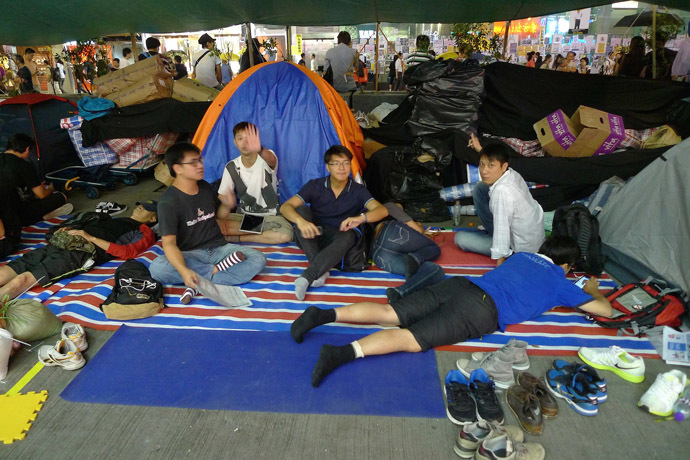
Several students that I spoke to, at the Admiralty and Mong Kok sites, did not even bother to hide their hatred towards the Communist system, and towards the government in Beijing. All of them were denying crimes that are being committed by Western nations, all over the world, or they were simply not aware of them. “Democracy” to them means clearly one and only thing – the system or call it regime, that is being defined, promoted and exported by the West.
“China is surely on the right side of the history,” I tried, at Admiralty, when I met protesters on the 31th October. “Together with Russia and Latin America it is standing against the brutal Western interventions worldwide and against the Western propaganda.”
I was given looks of bewilderment, outrage and wrath.
I asked students what they think about Venezuela, Bolivia, or Ecuador.
“Dictatorships,” they replied, readily and with spite.
I asked them about Bangkok and those “pro-democracy movements and demonstrations” conducted against the democratically elected government; demonstrations that led to the coup performed by the elites and the army on behalf of the West.
I asked about “pro-democracy” demonstrations against democratically elected President Morsi in Egypt, and about yet another military and pro-Western coup that brought the army back to power. In Egypt, several thousand people died in the process. The West and Israel rejoiced, discreetly.
But the Hong Kong students “fighting” for democracy knew absolutely nothing about Thailand or the derailment of the Arab Spring.
They also could not make any coherent statements about Syria or Iraq.
I asked about Russia and Ukraine. With those topics they were familiar, perfectly. I immediately received quotes as if they were picked directly from the Western mass media: “Russia is antagonizing the world... It occupied Crimea and is sending troops to Ukraine, after shooting down the Malaysian airliner...”
Back to Hong Kong and China, two girls, protesters, at Admiralty, clarified their point:
“We want true democracy; we want rights to nominate and to elect our leaders. The local leader now is a puppet. We hate communism. We don't want dictatorship like in China.”
I asked what they really want. They kept repeating “democracy.”
“What about those hundreds of millions that China raised from misery? What about China’s determined stand against Western imperialism? What about its anti-corruption drive? What about BRICS? What about its attempt to rejuvenate socialism through free medical care, education, subsidized culture, transportation and mixed/planned economy?”
Is there anything good, anything at all that China, the biggest and the most successful socialist country on earth, is doing?
Brian, a student at Mong Kok, explained:
“We want to express our views and elect our own leader. It is now dictatorship in China. They chose the committee to elect our leader. We want to have our own true democracy. Our model is Western democracy.”
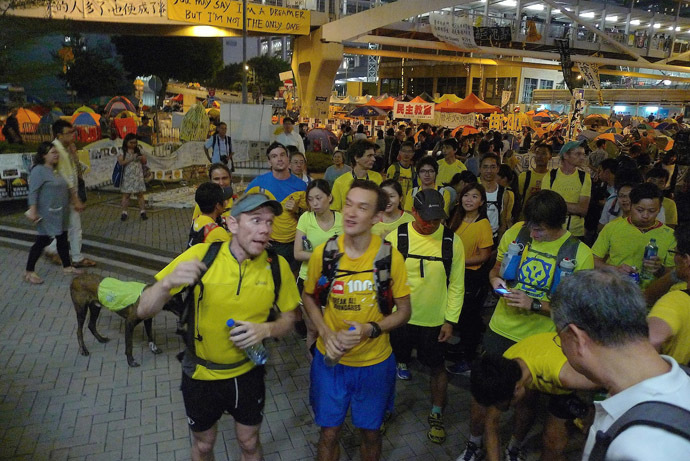
I asked at both protest sites about brutality of British colonialism. I received no reply. Then I noticed quotes by Winston Churchill, self-proclaimed racist and a man who never bothered to hide his spite for non-white, non-Western people. But here, Churchill was considered to be one of the champions of democracy; his quotes glued to countless walls.
Then I noticed the John Lennon Wall, with the cliché-quotes like’: “You may say I’m a dreamer, but I’m not the only one.”
Exactly what were they dreaming about? I was not told. All I saw were only those omnipresent banalities about “democracy” and “freedom.”
There were Union Jacks all over the place, too, and I even spotted two English bulldogs; extremely cute creatures, I have to admit, but explaining nothing about the aspirations of the protesters.
While hardly anyone speaks English here anymore, all cultural, ideological and propaganda symbols at the demonstrations and the “occupy” sites, were somehow related to the West.
And then, on the 29 September, in the evening, near Admiralty, I spotted a group of Westerners, shouting and getting ready for “something big.”
I approached one of them; his name was John and he came from Australia:
“I have lived in Hong Kong for quite some time. Tonight we organized a run from here to Aberdeen, Pok Fu Lam, and back here, to support the Umbrella Movement. Several foreigners that are participating in this have lived in HK for some time, too.”
I wondered whether this could illustrate the lack of freedom and Beijing heavy-handedness.
I tried to imagine what would happen under the same circumstances, in the client states of Washington, London and Paris, in the countries that are promoted by the West as “vibrant democracies.”
What would happen to me, if I decided to organize or join a marathon in Nairobi, Kenya, protesting again Kenyan occupation of Somalia or against bullying of the Swahili/Muslim coast? What would they do to me, if, as a foreigner, I would trigger a run in the center of Jakarta, demanding more freedom for Papua!
Thinking that I am losing my marbles and with it, objectivity, I texted a diplomat who is based in Nairobi. “Wouldn’t they deport me?” I was asking. “Wouldn’t they see it as interference in the internal affairs of the country?”
“They would deport you” the answer arrived almost instantly. “But before that, you would rot for quite some time in a very unsavory detention.”
I thought so...
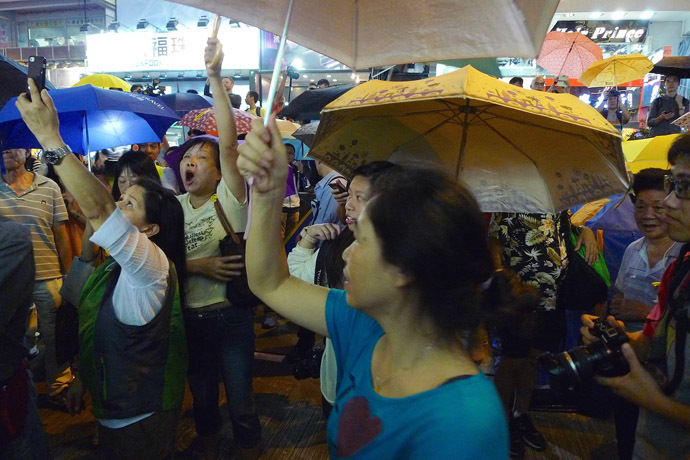
Some people actually see the demands as genuine and legitimate.
My friend, Basil Fernando, head of the Asian Human Rights Commission (AHRC), wrote to me:
“As for Hong Kong protests, they are very genuine local protests over serious local concerns. People of Hong Kong in their recent history acquired many rights, which people in other Asian countries have only in name, but not in real life. Reason is independent and functioning public institutions. The beginning of them can be traced to Independent Commission Against Corruption (ICAC), which stated in 1974. It was a success and as result, Hong Kong is quite a bribery and corruption free society. Having lived 25 years there I can confirm that. People have a genuine fear of losing these and that is why they want a greater say, to elect the Chief Executive. This is genuine local moment with limited political objectives.”
But one week later, when Basil and I met, face-to-face, in Hong Kong, he admitted:
“Many students in Hong Kong are uninformed, and some are spoiled. They never had to undergo any hardship in life. This is one of the richest places on earth. Some kids are scared of China. Ok, we can say that some of them are reactionaries... But it is understandable; there are those whose families fled Mainland China, in the past... The parents and grandparents were feeding their kids with all negative things about the PRC.”
A few minutes later I am having lunch at Cafe de Coral, a local chain. A young man walks in, wearing a T-shirt, which proclaims: “Real Time NAVY. US Military Base.”
In Hong Kong, it means nothing. It is not even a political statement, just a T-shirt.
As long as the city remains rich, anything goes. And it has been rich for many years and decades; under the British rule, and as part of China.
The question is, if they don’t care about politics, why do protesters block important arteries of the city, and for more than a month demand direct elections and “democracy,” whatever democracy means to them?
Or could there be something hiding underneath all this, and also, “in between the lines.”
“We have also our own poor people,” I am told by Brian, one of the protesters at Mong Kok.
The truth is that Hong Kong is not a social bastion like neighboring Macau, the former Portuguese colony. And, tellingly, while visiting Macau just a few days earlier, I was explained by several people that what is happening in Hong Kong, could never happen there, because in Macau, people feel “very close to Beijing,” have closer ties with PRC, and feel more satisfied with their lives.
Hong Kong, for decades, has been a turbo-capitalist, extremely consumerist, and aggressive society. Its people are facing some of the most unrealistic prices on earth, particularly for housing. It is not at all the land of milk and honey; it never was – under British colonial rule, or now.
There is also great frustration over losing that “uniqueness” and the cutting edge. Several Mainland Chinese urban centers are now becoming more attractive, with greater cultural life, bigger parks, more daring architecture, and more extensive public transportation.
It is likely that the recent protests are ventilating the general frustration of many Hong Kong residents, not only with Beijing, but also with Hong Kong itself.
Lacking ideology and political awareness, and for decades being bombarded with the Western anti-Communist and anti-socialist propaganda, protesters simply blame Beijing for everything, even for what they should be blaming its own extreme capitalist system.
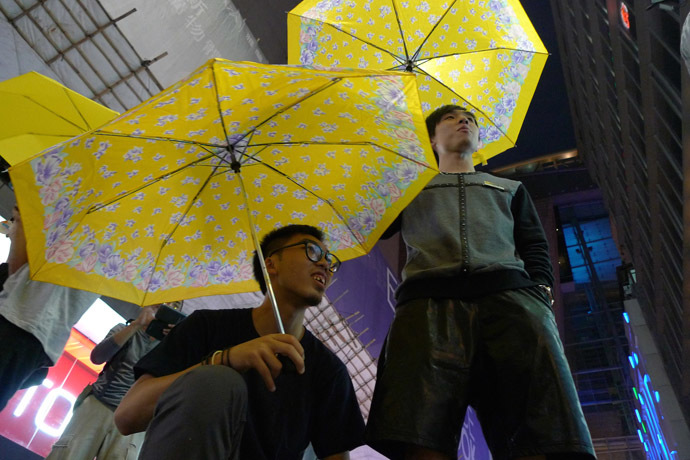
There are some exceptions. At the protest sites, there are some small groups demanding social justice. Not many of them, but there are some Marxists and Trotskyites, even urban anarchists.
My academic colleague remarked:
“Their agenda is professed democracy and direct elections of the chief executive, but the social demands highlighted by Occupy Central cannot be ignored, namely extreme income gaps, property prices out of reach for the young, and generally an uncertain future...”
Perhaps unwillingly, protesters are playing to the hands of the West, which is lately busy antagonizing, demonizing and bulldozing out of its way all countries, governments and movements that are resisting its quest for global dominance.
China, together with Russia, Venezuela and Iran, are on the top “hit list.”
Protests in Hong Kong came at an extremely opportune time, for the West.
Although China is acting with tremendous restraint (much greater, then the US, France or UK are acting towards their own protesters), it became a victim of yet another smear campaign in the Western mass media outlets.
If what the Hong Kong protesters want to achieve is only one goal, which is direct elections of their top executive, this is not the way to accomplish it.
Bringing out dirty laundry, when China, together with other BRICS countries is facing intimidation and direct provocation, is not going to evoke much sympathy in Beijing, or evoke in it a desire to compromise. These are tough and dangerous times, and everyone is edgy.
The mistake of the protesters is that, at least some of them are attacking directly the entire Chinese system, instead of concentrating on the local and practical demands.
By smearing China, protesters are playing into the hands of the West, into its propaganda and the manufacturing of extremely dangerous clichés and stereotypes, pointed at its adversaries. In a way, Hong Kong’s “Umbrella Movement”’ does to China what the “Euro Maidan”’ did to Russia, or what the right-wing protesters in Caracas did to “El Processo.”
Willingly or unwillingly, the Hong Kong protest movement joined the network of the color and other “revolutions,” designated to destabilize opponents of Western imperialism: those in Syria and Ukraine, in Cuba and Venezuela, in Thailand, Egypt and all over Africa.
When asked, Hong Kong protesters say that “they are not aware of that.” One could state that it would do no harm if they could get at least some political education, before erecting barricades and “unwillingly” joining global battles.
The statements, views and opinions expressed in this column are solely those of the author and do not necessarily represent those of RT.
The statements, views and opinions expressed in this column are solely those of the author and do not necessarily represent those of RT.













